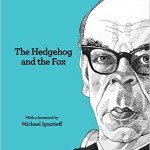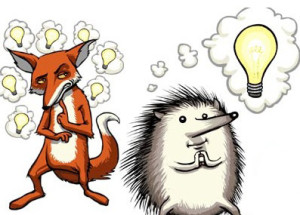Are you a fox or a hedgehog?
The folkish distinction between the two personality types can be found already in a text fragment from the Greek poet Archilochus, who flourished around 650 BC:”A fox knows many things, but a hedgehog one important thing”.
Like so much else from classical Greek literature, Archilochus’ proverb became popular in the Renaissance. In Adagia (see the full text here), Erasmus of Rotterdam gave the Latin version of it as “Multa novit vulpes, verum echinus unum magnum”.
 In our time, the dichotomy was again popularised by philosopher Isaiah Berlin. In The Hedgehog and the Fox (1953), Berlin distinguishes between human beings “who are fascinated by the infinite variety of things and those who relate everything to a central, all-embracing system.” (quote from here).
In our time, the dichotomy was again popularised by philosopher Isaiah Berlin. In The Hedgehog and the Fox (1953), Berlin distinguishes between human beings “who are fascinated by the infinite variety of things and those who relate everything to a central, all-embracing system.” (quote from here).
Most of my academic friends and colleagues over the years have been hedgehogs. They have stayed with the same academic discipline throughout their career and focused on a rather small set of problems, which they have circled around for years and decades, often with a large number of publications. They have produced comprehensive textbook articles and regularly been invited as keynote speakers to conferences to lecture on the state of the art in their fields.
I am definitely not a hedgehog. I have moved between several disciplines — from biology in the late 1960s, to the history and sociology of the intelligentsia in the 1980s, to the history of science/medicine in the 1990s, to museum studies in the 2000s — and I have also jumped from topic to topic within the discipline: as a historian of science I worked on the rise of ecology in Sweden, on the history of 20th century immunology, on scientific biography as a genre, etc.
Thus I have been working on shell formation in ectoprocts (my research topic in 1967-1969), on the use of cladistics in molecular evolution (1969-1971), on the history and sociology of intellectuals (1978-late 1980s), on the history of ecology (1977-1986), on the class structure in the information society (1982-mid 1980s) on the history of immunology (1990s), on new scientometric methods, on the life and work of the immunologist Niels K. Jerne, on studies in scientific biography (late 1980s-mid 2000s), and on collecting and display of contemporary science in museums (2006-2014).
I have actually done substantial work in all of these fields, publishing the results in peer-reviewed international scientific journals and so forth. In several of these fields I was a recognised expert, in some even a leading expert (and in at least one small field I am still the world expert).
But I never had the enduring passion (or patience) to remain within a single research field. As soon as I had marked my territory — by writing a couple of articles or a book, or edited an anthology — I went on to another field. There was always something more exciting, something more important, somewhere else. I never shifted abruptly; there was usually an overlap of one to several years when I worked in both fields simultaneously. But ultimately I always jumped on to something new.
Being an intellectual fox is a mixed blessing. On the positive side: you never get bored, you meet new and exciting scholars and learn something new all the time. It is always fresh territory. You become a kind of polymath (polyhistor).
The negative side of being an academic fox is that you feel you never get to the bottom of things. You never really master a whole academic field; you never get the chance to play the role of a grand old man in the field; you will never receive a Sarton medal (even if you had been as clever as the actual recipients).
Also, being a fox you make few academic friends of the kind that Aristotle describes as ‘accidental’, i.e., based on pleasure and utility. On the other hand, it might be easier to cultivate Aristotle’s third kind of friendship — that between people who are good and alike in virtue — because you are neither competing with nor utilising each other.
Isaiah Berlin once said he did not really take the fox-hedgehog dichotomy very seriously, telling his biographer that the title of the book was almost a joke. But even if we accept the dichotomy — and I think one shall take seriously adages that have survived since classical antiquity — the distinction is only ideal typical. I am not a fox 24 hours a day, seven days a week. I have hedgehogianic bouts as well, at least for shorter periods of time.
What makes the distinction interesting for my study of autobiography is not only that it apparently provides a neat summarising label for my life’s intellectual journey, but also that it draws my attention to other aspects of my life, where I seem to have displayed the same kind of behaviour. For many years I was an idealtypical fox in my private life as well, jumping from one relation to another and moving from one place to the other. Also with respect to cultural taste have I been serially promiscuous. (Politically, I have been pretty stable though.) Only now, towards the end of my life, I realise how great it is to live in one place and in a long-term stable relationship. So perhaps foxes turn into hedgehogs with age? Or maybe I have always been a hedgehog in fox disguise?
To what extent do such simple personality labels have a place in autobiographical writing? Are they common? Helpful? Too simplified? Misleading? Or is there, in spite of Berlin’s joking attitude, an ancient and uncontestable truth behind such labels? I will get back to this question in later posts.
A link to this post was published on Facebook 17 december 2015 and gave rise to a number of comments:
Aant Elzinga: I am a “hybrid” hedgefox. I am thinking of Isaiah Berlin’s use of the thought figure in his depiction of two perspective and methodologies in scholarly pursuits, one slow moving, plodding, strategic and in depth, the other the tactic of sniffing out, flitting here and there, embaracing seredipity in a more covert sense. The hybrid in my imagination inertwines someting of both approaches.
Thomas Söderqvist: Yes, I agree, the versatile ‘hybrid’ is an ideal. Hedgehogish or foxy, whenever needed.
Ken Caneva: It’s storytelling all the way down, notwithstanding the presence of what Fleck called “passive elements of knowledge.” Hence if that conceptualization enables you to tell a coherent–and interesting–story, then go with it.
Thomas Söderqvist: Story-telling?? No!? I’ll get back to that in much more detail later. But the Fleck notion is interesting. Locus fleckus?
Ken Caneva: See pp. 79-80, 82-84, and 101-102 of the English translation.
Christian Abrahamsson: Apropå igelkottar. Jag är nog en räv men jag känner igen mig i Ferlins igelkott.
“Av ständig oro för stort och smått
jag blev alltmera en igelkott.
Gott folk som klampar min väg förbi
de viskar ofta om hysteri.
Och några talar om stämning
och de moderna om hämning.
Gott folk må prata vad helst dom vill:
mej kryper ingen för nära till.
Jag har en fullgod repertoar
av tricks och konster till självförsvar.
Jag önskar inte bli biten
fast jag är konstig och liten.
Ja, konstig är jag till övermått
och en besynnerlig igelkott.
Ty dessa spjut som jag sträcker ut
har genomborrat mej själv förut.
Så ber jag, vänligen, bara
gott folk att låta mej vara.”
Nils Ferlin
Thomas Söderqvist: Det verkar vara en viss överensstämmelse mellan Ferlin och Berlin 🙂
Christian Abrahamsson: Ja, det hade man knappast kunna tro! Richard Feynman brukade beskriva sig själv som den ultimata räven. Jag antar att det kommer sig av att han brukade sitta och arbeta på strippklubbar.
Thomas Söderqvist: Foxy Feynman.
Thomas Söderqvist: PS – do as I wish? Anything goes in autobiographical ‘story-telling’? You’re so salacious, Kenneth. I looking for the TRUTH about myself!
Ken Caneva: Ah, now I see “your problem” with what I said: You seem to think storytelling is antithetical to truthtelling. I aspire to truth, too, but it doesn’t take much philosophical analysis–let alone many examples from the history of science and philosophy–to appreciate that the gap between one’s best evidence for some claim–the proper ground for belief–and one’s conviction of the truth of that claim can never be closed, only leapt over by an act of faith. Hence what are the proper underpinnings of our convictions? I offer Darwin’s theory of descent with modification as an example of what I mean. I insist that Darwin’s theory is essentially a plausible story that makes intelligible sense of (to keep to already used terms) a wealth of “passive elements,” a.k.a. “facts” as understood with some philosophical sophistication. Calling it a plausible story is not to denigrate its epistemic status, but to identify just why it was and remains so convincing: it had and has no real competitors precisely because no one has told an equally compelling counterstory. (A digression belongs here w.r.t. the assumed materialism of Darwinian evolutionary thought, but I’ll forego that as unnecessarily digressive, though in the end of great importance.) In my current work on the establishment of the principle of energy conservation during the second half of the nineteenth century I’ve been struck by the consistency with which its adopters invoked an analogy with the conservation of matter and–here more relevantly–told plausible stories about the energy economy of nature: the sun, plants, animal, fossil fuels, etc., etc. If we’re interested in why people believe certain things, we must pay attention to the stories they tell and find convincing. Whether those stories are true or not–well, that’s a toughie! One final comment w.r.t. the parenthetic reference to materialism: the chief reason why conventional scientific materialism fails is because it is unable to tell a convincing explanatory story that accounts for the full range of well-attested phenomena. Despite that, most people–at least most academic types and most scientists–believe the stories told under its assumption. Either you find an interesting story to tell about your life’s particulars, or you doom your (few!) readers to a laundry list of particulars. All those particulars might well be “true,” but their summation will not give you the desired truth about yourself.
Thomas Söderqvist: It’s evening here, I need a refreshed brain to respond to this. Out and over and au revoir until tomorrow 🙂
Thomas Söderqvist: In short, there are other alternatives than ‘stories’ to sum up the laundry list.

